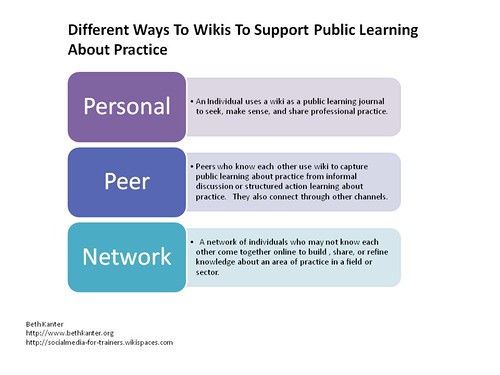
I’m just beginning a new crop of peer learning projects for nonprofits to learn the practice of being networked nonprofits and use social media effectively at Zoetica and through my work as Visiting Scholar at the Packard Foundation.
I’m also trying to shift my own practice into more design and train the trainers and coach the coaches versus direct delivery. It’s hard because you have to be very disciplined about noticing and documenting your practice.
Wikis can be terrific platforms for supporting professional learning in real time, but it requires a comfort level with “learning in public.” Learning in private is what most of us did in school. You wrote your essay, studied your spelling words, took tests (without looking at anyone else’s answers!). Learning was an individual, often solitary activity. For many of us of a certain age, that style has carried over to our work culture where we are rewarded for our expertise and to keep quiet what we don’t know (or screw up).
Social media has unleashed a fabulous opportunity for professional learning about practice in public. And that can be fun too! Certainly less exhausting than having to know everything.
Creating an environment for learning in public means that it is okay to say “I don’t know” about an issue or problem and to ask others what they think. When professionals acknowledge not knowing and reach out to a colleague, it not only opens us to learning, but it signals to others. Using social media and networked approaches successfully requires a culture shift away from learning in private to learning public or what Nancy White has called “Over the Shoulder Learning.”
How do you do this? How do create an environment where it is okay to learn in public? This environment can be a training workshop or it can be in an organization. One answer comes from Eugene Eric Kim in a presentation he did about networks, “Be the Change You Want To See” – it’s about modeling.

Three Different Designs for Public Learning On Wiki
Over the past five years, I have created many wikis to support online learning projects and wikispaces has been one of my platforms of choice because it is easy to use, free, and integrate other social media content. There are three different models:
Personal Learning or Portfolio Wikis: My first wiki was more “wiki portfolios” as my colleague Marshall Kirkpatrick phrased it. But it is more than an social media resume.
You can also use a wiki as a professional learning journal – a place to seek, make sense, and share learning about their practice. It’s open or public document. It can be “transparent” so others can peer or browse or can be open and others contribute or comment. I’ve created a couple spaces like this for: Listening and Screencasting. Debra Askanase has a terrific space for Facebook Landing Tabs.
Peer Learning: The wiki is used a platform to capture group knowledge about practice. Often, face-to-face and conference calls are used to supplement the group’s work together as well as other social media platforms. Examples include the Social Media Lab, Leveraging Social Media for Arts Organizations, and the Networked Funders.
Network Learning: This example involves a network of people looking at a field of practice beyond a peer learning group. For example, on the Packard Foundation OE wiki , which started as a “see through filing cabinet” has moved into engaging with nonprofit consultants and evaluation geeks about the prelminary findings of its evaluation of nonprofit consulting practice. NTEN facilitated a wiki to create workshop curriculum for social media and nonprofits with more than 200 nonprofit technology practitioners as part of the WeAreMedia project.
How else are nonprofit professionals, organizations, and fields using social platforms like wikis for public learning about practice?
Beth Kanter is a consultant, author, influencer. virtual trainer & nonprofit innovator in digital transformation & workplace wellbeing.
